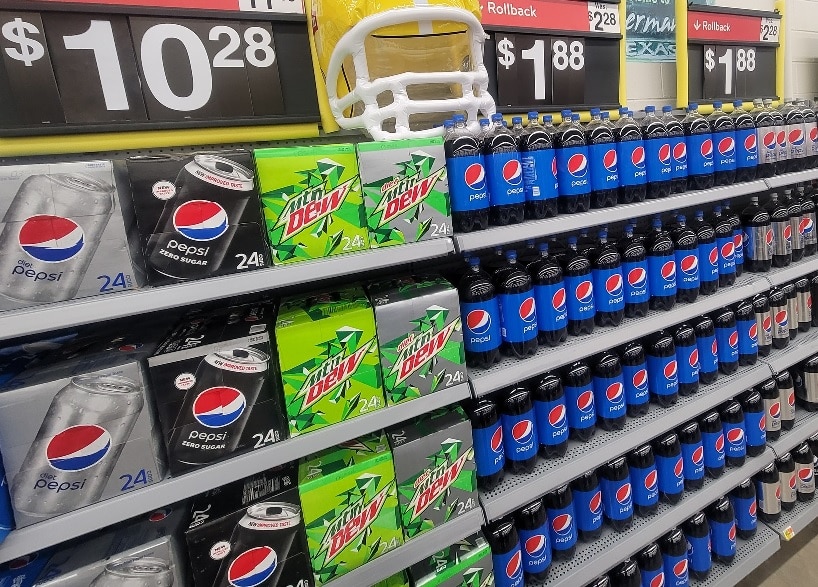
Why is the regular price of a two-liter bottle of Coke or Pepsi currently $2.99 at most grocery stores – even higher in some places – but Walmart is able to sell it for $1.88?
That’s what federal regulators reportedly want to know, as they investigate the pricing practices of the two leading soda manufacturers whose products can be sold at very different prices, depending on the store.
As first reported by Politico and later matched by several other outlets, the Federal Trade Commission is said to be investigating potential price discrimination on the part of Coca-Cola and PepsiCo, probing whether the soft drink giants are offering preferential pricing for their largest retail customers, like Walmart, and forcing smaller retail competitors to pay – and charge their shoppers – higher prices.
The reports state that the investigation is in its early stages, with the FTC requesting information from both soda makers and several large retailers on how they price soft drinks. While PepsiCo hasn’t commented, Coke has confirmed its cooperation in the probe, saying it is “committed to fair and lawful competition in the marketplace,” but “any assertion that the company has done anything unlawful with respect to the sale and distribution of its products is unfounded and we are prepared to defend any specific accusations accordingly.”
The investigation comes nearly two years after the National Grocers Association, a trade group representing the independent supermarket industry, called on the FTC and Congress to “investigate the unchecked power of big box stores and e-commerce giants,” which they say “are squeezing suppliers and as a result, forcing higher prices and fewer products on independent grocers and their customers.”
Large retailers are able to use their scale to get preferential pricing from suppliers that they can then pass on to shoppers, the NGA argues. It sounds like a good deal for consumers – but only if they shop at those large retailers. Those who rely on smaller, independent grocers end up having to pay higher prices, essentially subsidizing the lower prices that shoppers at large dominant retailers pay. In some cases, the NGA says independent grocers get a better deal by buying products at a store like Walmart or Costco and marking them up to sell in their own stores, rather than paying what the manufacturers want to charge them.
The soda investigation would be among the first of its kind in recent years, as the FTC has signaled renewed interest in enforcing the long-dormant Robinson-Patman Act. That antitrust law says, in part, that one cannot “discriminate in price between different purchasers… where the effect of such discrimination may be substantially to lessen competition.” That means if a manufacturer offers a preferential pricing deal to some retailers but freezes out others, it could be running afoul of the law.
Robinson-Patman was designed to help small retailers better compete with large chain stores. But it fell out of favor in recent decades, as opponents argued enforcing it would penalize large retailers for their success, and just result in higher prices across the board for all shoppers. Who is helped, really, if Walmart is forced to sell a two-liter of soda for $2.99 like everyone else?
Of course, some might argue that a soda investigation isn’t exactly the best test case for potential price discrimination. Various health advocacy groups have argued over the years that there shouldn’t be price discounts on products like sugary soda at all. “Given the link between high added sugar intake and adverse health outcomes, it is not acceptable for companies to continue to aggressively market sugary drinks in grocery stores,” the Center for Science in the Public Interest argued in a 2021 report.
So if you’re a soda drinker, keep an eye on the prices at your local stores. The result of this investigation could determine whether smaller stores get to charge less – or if you end up paying more no matter where you shop.
Image source: Walmart/Facebook











